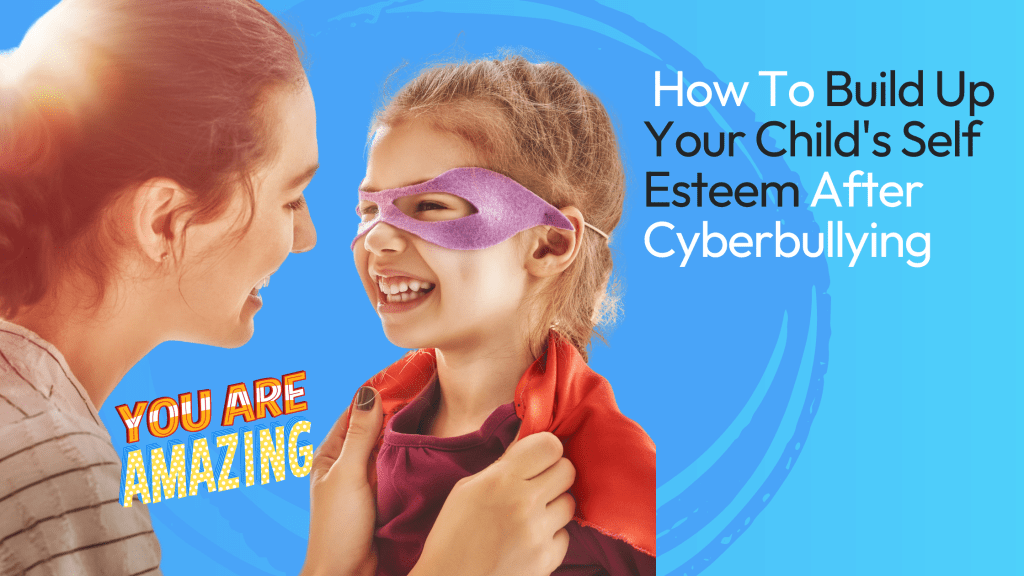Parents are always working with their children to build their self esteem, but after being cyberbullied, it becomes that much more important.
Cyberbullying is becoming a big problem the US and around the world. Because today’s kids are hyper-connected to one another via gaming systems, smartphones, tablets and laptops, it probably isn’t a huge surprise that cyberbullying it becoming a bigger problem every day. And it can be challenging to cope with because so many parents these days, especially if they are Gen Xers or younger Millennials, don’t have any first-hand experience in cyberbullying because the Internet was in its infancy during their formative years. But today’s connected kids and teens are facing a scary amount of harassment that is no longer confined to the schoolyard.

How t build up your child’s self esteem
Cyberbullying.org defines cyberbullying as “Cyberbullying is when someone repeatedly and intentionally harasses, mistreats, or makes fun of another person online or while using cell phones or other electronic devices.” According to a recent article, as many as 7 out of 10 kids will be cyberbullied before they hit 18. Seventy percent! According to that same study, the most common type of cyberbullying is mean comments, which makes up 22.5 percent of cyberbullying. My heart definitely hurts for today’s kids and teens.
Cyberbullying: how to tell if my child is a victim
According to StopBullying.org, there are several warning signs you can look for that might indicate your child is being bullied:
- Difficulty sleeping or frequent nightmares
- Declining grades
- Frequent stomach aches or feeling sick
- Loss of friends or the child doesn’t want to attend social functions
- Decreased self-esteem or a feeling of hopelessness
If your child is exhibiting any of these symptoms, it could be a sign that they are being bullied, either online or in person.
Cyberbullying: my child is a victim, now what?
There are several steps you can take if your child is being cyberbullied, depending on the severity of the crime. If the crime is mean words hurled at your child, you may consider talking to the offender’s parents or the school the offender attends, if you know the child or the child attends your child’s school. If your child can block the offender on an app or block the offender’s phone number, encourage your child to do so. Help your child distance themselves from the online offender in any way your able. However, if the crime centers around serious crimes or if the crime involves photos or illegal activity, Cyberbullying.org has a great list of steps you can take here.
Cyberbullying: how to rebuild my child’s self-esteem after cyberbullying
If your child is down the dumps because they’ve recently been cyberbullied, you can help them on their road to healing after their experience. Although you might not know firsthand what cyberbullying feels like, it is important that you acknowledge their feelings without judgement or dismissal. Your child’s feelings are valid, and simply telling them to “get over it” may backfire.
Try these steps to help your child recover and flourish after being cyberbullied:
- Spend time with your child. Remind them how much you love them and how invaluable you find their company and their ideas. Bond with your child doing something you both enjoy, and make sure to leave your phone elsewhere so your child gets your undivided attention.
- Show empathy and let your child explain their feelings. A mean word or phrase texted or posted online may not feel impactful to you, but don’t diminish your child’s feelings. Help them understand that words have power and that their hurt feelings are valid. Let your child know that you are a shoulder to lean on.
- Help your child find new opportunities to socialize with like-minded people. Does your child like to read? Check and see if your library has a book club for kids their age. Have a sports lover? Look up teams in the area for the sport of your child’s choice. Was your child made for the stage? Try to find a local theatre group. Helping your child find a new group of like-minded peers will help them understand they have a place where they are wanted and appreciated.
- Empower your child. Sadly, the cyberbullying experience that they just had may not be the last. Talk to your child about the way the experience made them feel and then ways they can change the narrative if it happens again. Talk about things they can do to prevent getting into a similar situation and ways to cope if they do.